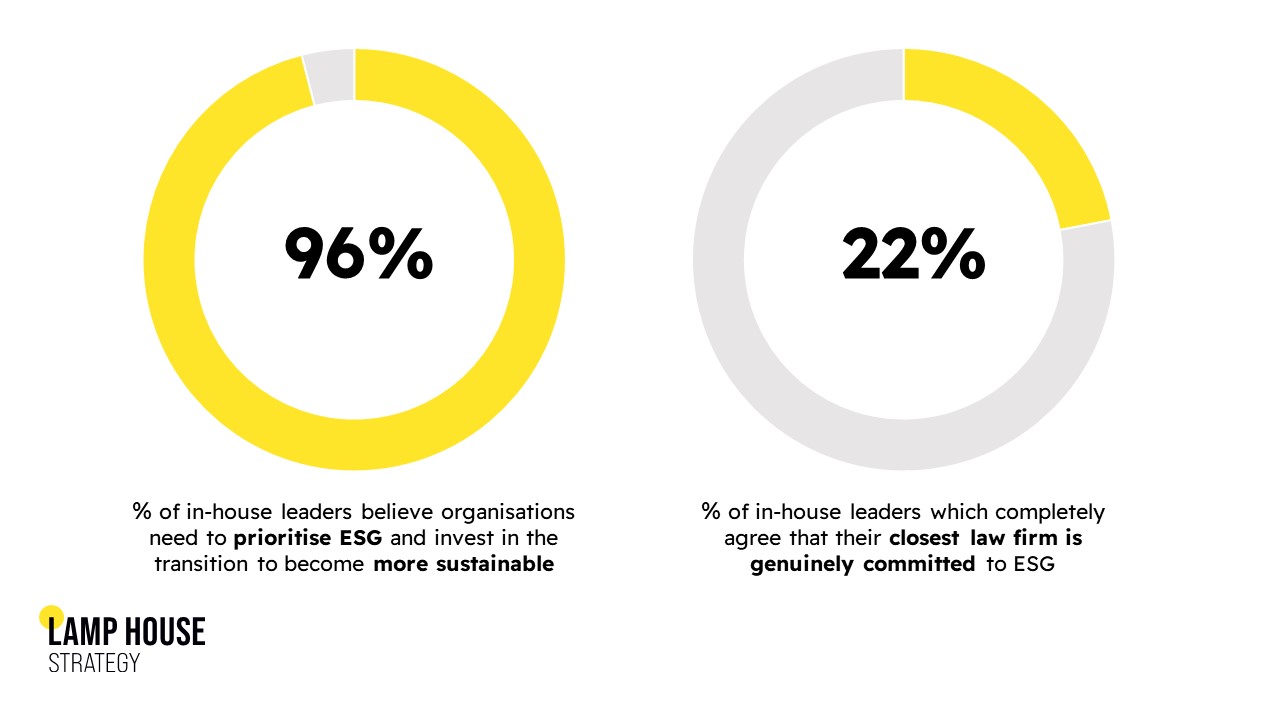What law firm clients think about ESG (and how law firms can respond)

The focus on ESG has grown exponentially within the corporate world and there are few signs to suggest it is going away any time soon.
Despite that, many corporations are still finding their feet when it comes to ESG.
It is a similar picture in many law firms, particularly with Partners, with ESG seen as relatively new and unfamiliar territory.
This creates a whole new set of challenges for law firms to unpack: understanding which elements of ESG to prioritise, generating internal buy-in for ESG initiatives and developing the right external messaging to showcase the firm’s commitment and action on ESG issues.
How can law firms start to address some of these challenges? For a truly authentic approach to ESG, firms need to be guided by the voices and needs of stakeholders.
That’s why we surveyed over 100 in-house legal department leaders in the UK at the start of 2023 to understand how they are thinking about ESG.
Our findings reveal the depth of support for ESG within in-house legal departments, their main areas of interest and their view of how law firms are performing on ESG.
What is ESG?
ESG stands for Environmental, Social and Governance. In our research with GCs, we encouraged them to think about the three pillars of ESG in the following way:
- Environmental – what is an organisation’s impact on the planet?
- Social – what impact does an organisation have on people? This may include clients, staff, other stakeholders and the wider community.
- Governance – how is an organisation governed? This may include transparency, as well as honest and clear reporting on its activities.
What do law firm clients think about ESG?
One of the headline findings from our research was that 96% of all in-house leaders agreed that organisations need to prioritise ESG and invest in the transition to becoming more sustainable.
This represents a huge majority of corporate support for ESG, a pleasant surprise given a growing anti-ESG backlash. It is also something we are monitoring across geographic markets: preliminary findings from our research with GCs in North America suggest there are similar levels of strong support for ESG in Canada but less so in the United States, where ESG has become a partisan issue.
We also asked our UK GCs which elements of ESG are important to them personally.
This revealed another surprise; 64% of GCs said that lawyers being trained to deliver advice through an ESG lens was important. Other findings across our research backed this up – 8 out of 10 believed that most lawyers should develop ESG knowledge and that it should not just be the preserve of ESG specialists.
Together, this seems to suggest how important GCs view ESG to their own personal development, and its importance in how they can advise their own business and help it to thrive.

The other elements of ESG as being important in our research are:
- Improving governance to ensure businesses act responsibly;
- Improving mental health and wellbeing;
- Improving DEI; and
- Protecting the environment.
The picture changed slightly if we compared responses from men and women. For women GCs, the number one issue was improving DEI (selected by 66%), followed by protecting the environment (56%).
What do law firm clients see from their firms?
Clients are actively asking law firms about their ESG strategies.
75% of in-house lawyers say they have asked their external law firms about their ESG commitments and strategies.
62% told us they have already asked their law firms to report on specific metrics or declarations in relation to ESG. This is likely to grow; of those that hadn’t already asked law firms to report, the majority expected they would be doing this for the first time in 2023.
One of the most notable divergences in our data was the gap between how many GCs personally believe in the importance of ESG, versus those who believe their law firms are genuinely committed to the issue.
While 40% of GCs completely agreed that their own organisation’s CEO was genuinely committed to ESG, only 22% felt this was true for the law firm they have the closest relationship with.

Examining the responses more closely, over a third of clients responded neutrally or responded ‘don’t know’ to this question. To us, this indicates that, at this moment in time, clients haven’t seen any – or enough – tangible actions from their law firms which clearly demonstrate a commitment to ESG.
This perceptions gap is something law firms need to work on in order to align themselves to their clients’ way of thinking on ESG.
How can law firms respond?
We asked GCs how they felt law firms can better align to their needs as a client overall; building trust with their law firms was one of the main themes repeated across their responses. In practical terms, clients saw having open and honest conversations and greater efforts to communicate both ways as the best ways to achieve this.
Anecdotally, the in-house community told us that it is very rare for law firms to proactively come to them to discuss ESG. But through the simple act of asking clients to participate in client feedback (through an ESG lens), a law firm demonstrates that it is taking action on ESG and genuinely cares about the views of its stakeholders.
These feedback conversations can be used for establishing what individual clients see as the top ESG priorities, what actions they see from law firms which resonate with them, and where there are opportunities for greater partnership between their two organisations.
From our own experience of client feedback, we know clients have provided great recommendations to their law firms on how they can be making greater impact together. A few examples would be:
- Co-creating diversity programmes;
- Building internship opportunities for law students;
- Developing ESG-specific training for in-house teams; and
- Establishing frameworks that support more mindful working relationships.
Law firms need to be bold, take the initiative and proactively ask clients about ESG – it’s an issue that is too important for clients to be ignored.
In a market where law firms are too shy in telling the world about their ESG strategies and aspirations, being more vocal and active in this space is also a potential source of brand differentiation.
With clients hugely invested in the topic of ESG, now is the time for law firms to start the conversation with their clients – it will improve client understanding, help grow relationships in new ways and provide a foundation of evidence for building an authentic and impactful ESG strategy.

